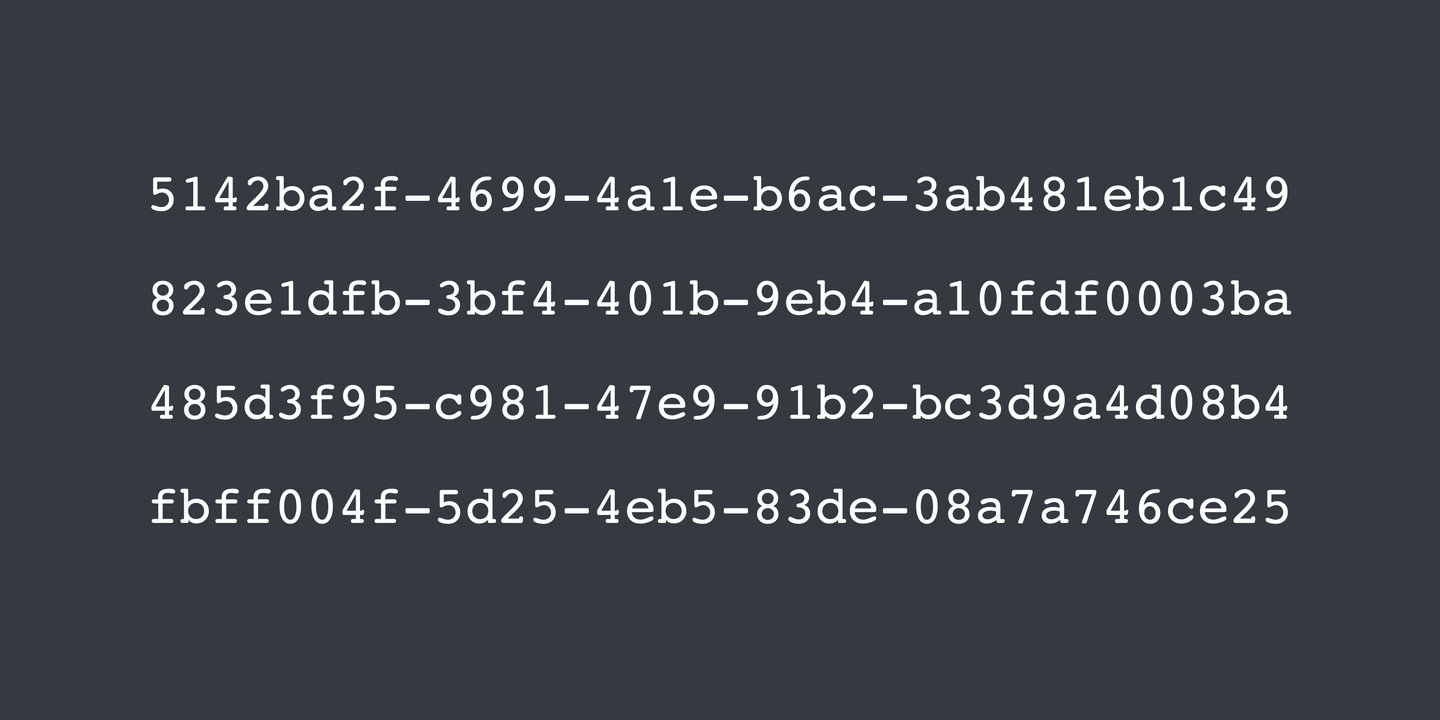Hibernate Generate Uuid As Primary Keys

Sep 01, 2009 The default way in JPA for primary keys is to use the @GeneratedValue. JPA Implementation Patterns: Using UUIDs as Primary Keys. From location a to b without having to re-generate keys.
Using Hibernate to generate id incrementally As we have seen in the last section that the increment class generates identifiers of type long, short or int that are unique only when no other process is inserting data into the same table. In this lesson I will. As you’ve seen, you can also use UUIDs as primary keys and let Hibernate handle the value generation. Hibernate’s UUIDGenerator supports the creation of version 1 and version 4 UUIDs as defined by IETF RFC 4122. By default, it generates version 4 UUIDs which is a good fit for most use cases. The default way in JPA for primary keys is to use the @GeneratedValue annotation with the strategy attribute set to one of AUTO, IDENTITY, SEQUENCE, or TABLE. You pick the most appropriate strategy for your situation and that’s it. But you can also choose to generate the primary key yourself. Using UUIDs for this is ideal and has some great. Feb 28, 2016 Auto increment keys vs. Tldr: Programmers should love values and UUID is a value. Today I would like to write about not so obvious point of view on. Aug 08, 2017 Every JPA entity is required to have a field which maps to primary key of the database table. Such field must be annotated with @Id. Simple vs Composite primary keys. A simple primary key consists of a single Java field which maps to a single table column. A composite primary key consists of multiple Java fields which individually map to.
| importjava.io.Serializable; |
| importjava.nio.ByteBuffer; |
| importjava.util.Arrays; |
| importjava.util.UUID; |
| importjavax.persistence.Access; |
| importjavax.persistence.AccessType; |
| importjavax.persistence.Column; |
| importjavax.persistence.Embeddable; |
| @Embeddable |
| @Access(AccessType.FIELD) |
| publicclassUniqueIdimplementsSerializable { |
| privatestaticfinallong serialVersionUID =4458438725376203754L; |
| @Column(columnDefinition='BINARY(16)', length=16, updatable=false, nullable=false) |
| privatebyte[] id; |
| publicUniqueId() {} |
| publicUniqueId(byte[] id) { |
| this.id = id; |
| } |
| publicUniqueId(Stringid) { |
| this(toByteArray(UUID.fromString(id))); |
| } |
| @Override |
| publicStringtoString() { |
| return toUUID(id).toString(); |
| } |
| publicstaticUniqueIdfromString(Strings) { |
| return fromUUID(UUID.fromString(s)); |
| } |
| publicstaticUniqueIdfromUUID(UUIDuuid) { |
| returnnewUniqueId(toByteArray(uuid)); |
| } |
| privatestaticbyte[] toByteArray(UUIDuuid) { |
| ByteBuffer bb =ByteBuffer.wrap(newbyte[16]); |
| bb.putLong(uuid.getMostSignificantBits()); // order is important here! |
| bb.putLong(uuid.getLeastSignificantBits()); |
| return bb.array(); |
| } |
| privatestaticUUIDtoUUID(byte[] byteArray) { |
| long msb =0; |
| long lsb =0; |
| for (int i =0; i <8; i++) |
| msb = (msb <<8) (byteArray[i] &0xff); |
| for (int i =8; i <16; i++) |
| lsb = (lsb <<8) (byteArray[i] &0xff); |
| UUID result =newUUID(msb, lsb); |
| return result; |
| } |
| @Override |
| publicinthashCode() { |
| finalint prime =31; |
| int result =1; |
| result = prime * result +Arrays.hashCode(id); |
| return result; |
| } |
| @Override |
| publicbooleanequals(Objectobj) { |
| if (this obj) |
| returntrue; |
| if (obj null) |
| returnfalse; |
| if (getClass() != obj.getClass()) |
| returnfalse; |
| UniqueId other = (UniqueId) obj; |
| if (!Arrays.equals(id, other.id)) |
| returnfalse; |
| returntrue; |
| } |
| publicstaticUniqueIdgenerate() { |
| return fromUUID(UUID.randomUUID()); |
| } |
| } |
Hibernate Generate Uuid As Primary Keys In Excel
commented Feb 12, 2016
Lifesaver! Used this for general byte[] primary keys with a reordered UUID component |
Hibernate Uuid String
Most developers prefer numerical primary keys because they are efficient to use and easy to generate. But that doesn’t mean that a primary key has to be a number. UUIDs, for example, have gained some popularity over the recent years. The main advantage of a UUID is its (practical) global uniqueness which provides a huge advantage for distributed systems. If you use the typical, numerical ID that gets incremented for each new record, you need to generate all IDs by the same component of your system or the components need to communicate with each other. With a globally unique UUID, you don’t need all of this. Each component can generate a UUID and there will not be any conflicts.
What is the vagrant generated private_key. Where vagrantrsa and vagrantrsa.pub is the private and public keys located in current vagrant project folder (and generated e.g. By ssh-keygen -t rsa -C 'your@email.here') and openssh.ps1 is. Dec 24, 2014 Vagrant supposedly uses the same insecure private key by default, which allows for easy ssh to the VMs. But lately vagrant has been replacing my private key when booting a VM.